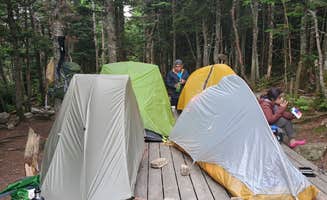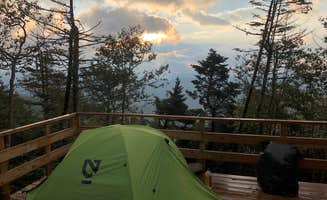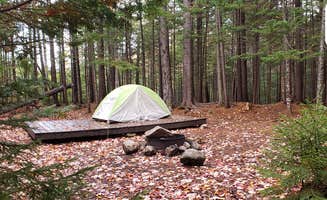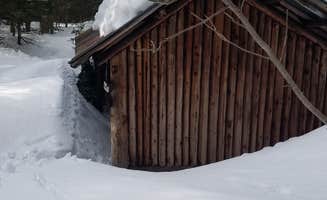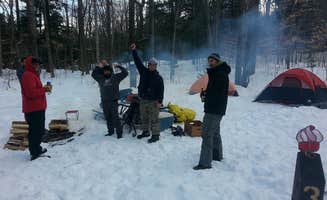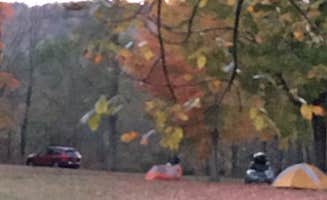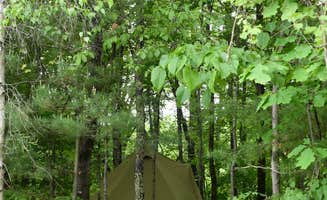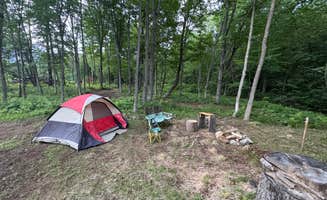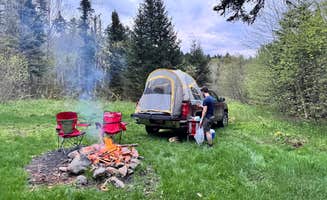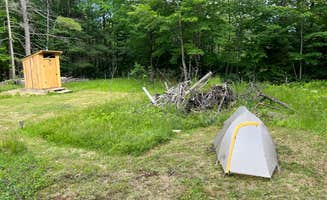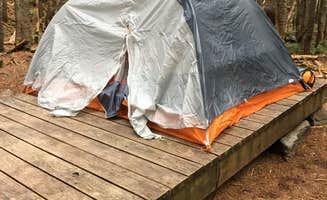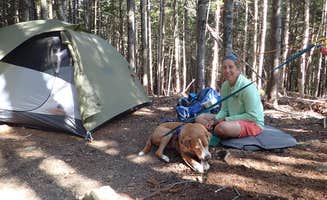North Woodstock serves as a strategic basecamp for accessing White Mountain National Forest's primitive tent sites between 1,500-4,360 feet elevation. Winter conditions persist into late spring at higher elevations, with many sites retaining snow into May. Several established backcountry campsites require hikers to carry all supplies through challenging terrain while following strict environmental regulations.
What to do
Summit nearby peaks: From Guyot Shelter, experienced hikers can access multiple 4,000-foot summits. A reviewer who used Guyot as a midpoint for the Pemi Loop noted: "We got to the site, claimed our platform and hiked over to West Bond to catch a beautiful sunset." Another camper appreciated the location "on the Pemi Loop" with access to surrounding mountain terrain.
Fish in secluded ponds: Sawyer Pond offers fishing opportunities in different seasons. One visitor shared: "I've ice-fished on the pond. Sites are first-come, first-serve with a tent platform and fire pit." The pond attracts anglers year-round with its accessible waterfront.
Watch wildlife: The trails around North Woodstock cross prime moose habitat. According to a camper at Rogers Ledge: "A gradual climb from the trail head to the campsite through a few boggy areas before climbing into the boreal forest for a bit. Prime moose habitat!" Early morning and dusk provide best wildlife viewing opportunities.
What campers like
Wooden tent platforms: Nearly all established tent sites feature wooden platforms rather than ground surfaces. A visitor to Kinsman Pond Shelter explained: "The hike in isn't easy especially considering you'll need to carry all your gear in to stay... There are a few tent platforms also." Platforms require freestanding tents.
Food storage options: Most sites now offer bear boxes, reducing the need for hanging food. At Garfield Ridge Campsite, a camper noted: "Bear boxes are right next to the cooking area for overnight use." Another visitor mentioned the "large eating area" and "helpful staff" that maintain the site.
Water access: Sites typically feature natural water sources requiring treatment. One camper at Fourth Iron Campground described: "Sites are situated just off the Sacco River and river access is easy, with multiple rocky beaches in between the sites and river. The water is clear and cold, refreshing on a warm day." Water sources can diminish during dry periods.
What you should know
Trail difficulty: Most backcountry sites require substantial hiking with full packs. A visitor to Ethan Pond Shelter reported: "3 mile hike in from Ripley Falls parking lot, a nice spur trail to a water fall to explore on the hike up or down." Routes often include steep sections with rocky terrain.
Seasonal restrictions: Campgrounds have varying accessibility depending on season. A Rogers Ledge visitor advised: "Check the WMNF website prior to hiking in to ensure the campsite is open." Many higher elevation sites close during mud season (April-May).
Capacity concerns: During peak summer weekends, sites often fill early. A Sawyer Pond visitor warned: "Due to the site's popularity, plan accordingly. Have a back-up plan for an alternate camping location." Weekday visits typically face less crowding than weekend trips.
Tips for camping with families
Choose gentle approaches: For families with children, select sites with shorter, flatter access trails. One camper recommended Nauman Tentsite: "This is a beautiful camping area with several tent platforms, in the white mountains. It is an easy 3 mile hike for an adult, I did it with my 5 year old in tow." Another visitor called it a "great trip for the whole family!"
Start with short trips: Begin with overnight stays before attempting longer journeys. A Sawyer Pond visitor noted: "This is a great beginner backpacking trip, great even for kids! The site has one shelter and 6 campsites available on the bank of Sawyer Pond." The 1.5-mile approach trail makes it accessible for families.
Teach bear awareness: Use family camping as an opportunity for wildlife education. At Fourth Iron Campground, "This is bear country, so bear boxes are provided." Show children proper food storage techniques and safe camping practices around wildlife.
Tips from RVers
Car camping alternatives: For those transitioning from RV camping to tent sites, several locations offer vehicle-accessible options within 30 minutes of North Woodstock. Dugout Hideaway @ Granny Clark Brook provides a drive-in option with amenities like picnic tables and fire rings when primitive camping seems too challenging.
Supply staging: Leave extra supplies in your vehicle at trailheads. A Fourth Iron Campground visitor advised: "I would suggest packing in a manner that allows you to get your things from your car to the site easily and with the fewest trips possible." Organize gear in backpacks before leaving vehicles.
Seasonal considerations: Weather conditions change rapidly in the White Mountains. A Kinsman Pond visitor reported: "Tough hike in, but worth it for the quiet and secluded location... Amazing stay, no signs of society (airplanes/cars/phone service)." Always check current trail conditions before attempting backcountry access.


